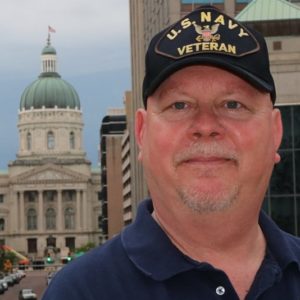The Libertarian candidate for governor of Indiana had 24 percent support in an early September poll of likely voters and is about to give the sitting Republican governor, Eric Holcomb, a run for his money.
But who is he?
Donald Rainwater, age 56, is a software engineer and IT project manager from Hamilton County, north of Indianapolis. He served eight years in the U.S. Navy and has a wife and grown children. That’s his basic biography.
As with most Libertarians, things get a bit more interesting when they begin to talk.
“If we believe in the intent of the Declaration of Independence and the Constitution of the United States or the constitution of the state of Indiana, then we have to make a decision,” Rainwater told InsideSources. “Are we going to be a nation of laws, are we going to be a nation of limited government based on constitutional constructs, or are we just not? And… I choose to follow the Constitution.”
Rainwater was nominated by the state Libertarian Party in March, just weeks before Gov. Holcomb issued a stay-at-home order closing what he deemed “non-essential” businesses. Opponents of Holcomb’s actions, many of them Republicans, have rallied around Rainwater in opposition to what they believe is the governor’s overreach.
“I can tell you that I would not have mandated people staying at home,” Rainwater said. “I would not have mandated shutting businesses down, or creating classes of essential and nonessential, and some businesses are more essential than others so some can stay open and operate normally while others have to operate curbside.”
As in many other states, only so-called ‘essential’ businesses were allowed to remain open in the spring and early summer, which shut down thousands of independently-owned local stores, while national chain stores like Wal-Mart and Target stayed open.
“I would not have shut churches down period, and I personally find it offensive that any government official would ever tell churches, ‘Sorry, you can’t have in-person services and you can’t practice communion unless you do it the way we specify,’” says Rainwater, “I believe that not only violates the First Amendment of the federal Constitution, but I believe it violates the state constitution as well.”
And Rainwater says he would not have required masks, in contrast with Holcomb who just extended the statewide mask mandate and recently said masks are “a fact of life right now.”
“I would never mandate masks,” Rainwater said, “because every time somebody says, ‘Well, we need to follow the science,’… Well, can you please show me the science? Don’t just tell me that you’ve looked at it, so you’re going to tell me what to do. I don’t think that’s the society we’re supposed to be living in.”
On Sunday, Rainwater addressed a crowd of anti-mask protesters outside the governor’s mansion in Indianapolis, while state police stood silent and watching from inside the locked gates.
The one that really bugged him was the $2-per-pack cigarette tax, and the plan to use the revenue for road repairs.
“I couldn’t help but think to myself, ‘Well, you can’t do both. Because if people stop smoking, you won’t be raising revenue for road repair, because they won’t be buying the cigarettes. And if you raise revenue for road repair with an additional cigarette tax, people won’t be stopping smoking. So you can’t say you’re trying to do those two things with this tax. You’re just lying to me,’” he says.
“And the more I looked at the way that things were presented, and the way that the government explained what they were doing or planning to do, the more frustrated I became with the lack of transparency, the diametrically opposed explanations as to why things were being done, and just the general, almost obvious disdain that state government was showing for the citizens of the state Indiana. And the more I looked, the madder I got, the madder I got, the more I wanted to be involved.”
And Rainwater doesn’t just want no new taxes. He says if elected governor, he’ll work to scrap the state income tax (personal, not corporate), and also the property tax.
“I believe that with the economic crisis that we’re faced with today, where small-business owners were given a much more difficult burden to bear by the governor than corporations were, this would help them recover. You can never eliminate what was done to them. You can’t go back and erase it,” Rainwater said. “But giving people the knowledge that they’re not going to have to pay individual income tax to the state, I believe that that allows people in today’s economic crisis the peace of mind of knowing, I can go out and generate income to pay my bills, take care of my family and I don’t have to worry about, ‘Am I gonna have to file taxes on this money?’”
“I believe that we’re supposed to be able to, as Reagan put it, self-rule,” Rainwater said. “And if we can’t self-rule, how can any of us rule everybody else?”

